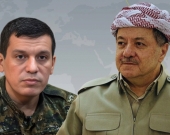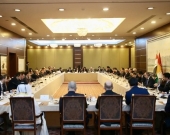Iran says it owns more uranium than needed

In an interview with the Associated Press, Larijani said the surplus uranium would be discussed with Western powers in the context of possibly halting its enrichment of uranium to 20 percent, which has been a key concession sought in the negotiations.
"Through the process of negotiations, yes, things can be said and they can discuss this matter," he said, on the sidelines of a meeting of the world organisation of parliaments.
The 20 percent-enriched uranium is much closer to weapons-grade material than the level needed for energy-producing nuclear reactors, but Larijani says it needs the higher enrichment solely for energy, research and isotopes for medical treatments, not for nuclear weapons.
He said Iran produced the enriched uranium itself because the UN's International Atomic Energy Agency would not provide it.
"But we have some surplus, you know, the amount that we don't need. Over that we can have some discussions," he said, referring to next week's talks with Western powers.
Following the publication of the interview, the Iranian parliament's public relations department denied the portion of Larijani's comments related to an excess of uranium.
In a statement run by the state-run ICANA news agency, the parliament's PR department said the claim that Iran had uranium in excess of its needs "is the opposite of reality and has no basis in truth".
'A new approach'
Iran plans to negotiate over its nuclear programme next week with the US, Russia, China, Britain, France and Germany.
They would be the first talks between Iran and the six since the election in June of President Hassan Rouhani, who has called for a speedy settlement of an issue that has been stalled for eight years.
At meetings in Almaty this year, the six proposed that Iran suspend uranium enrichment at the 20 percent level it says it needs for a medical research reactor, and to halt enrichment at its underground plant at Fordo.
In return, they would ease some sanctions on trade in gold and petrochemicals.
But Iran's foreign minister, Javad Zarif, said on Sunday that those offers were now "history," and that the group "should come to the negotiating table with a new approach."
Al Jazeera












